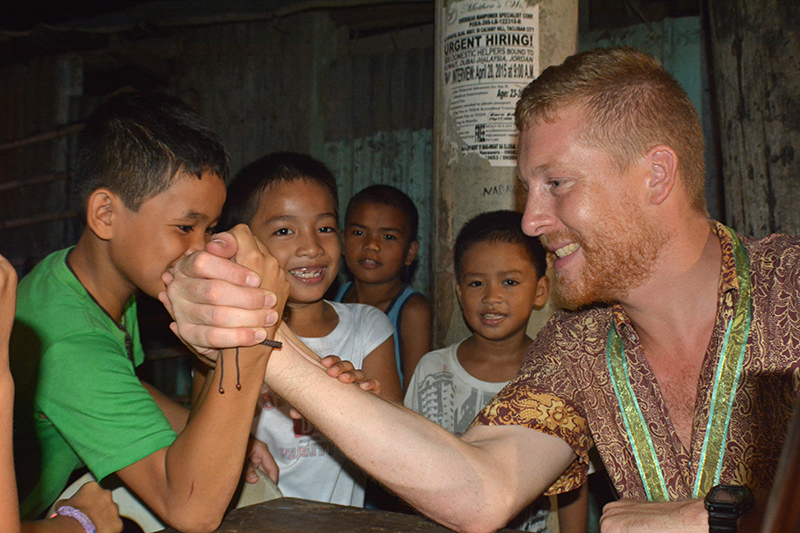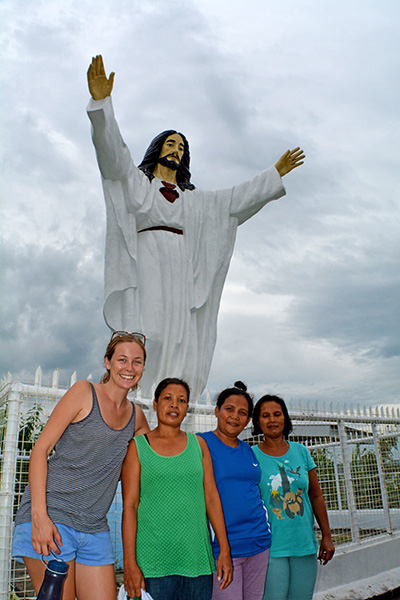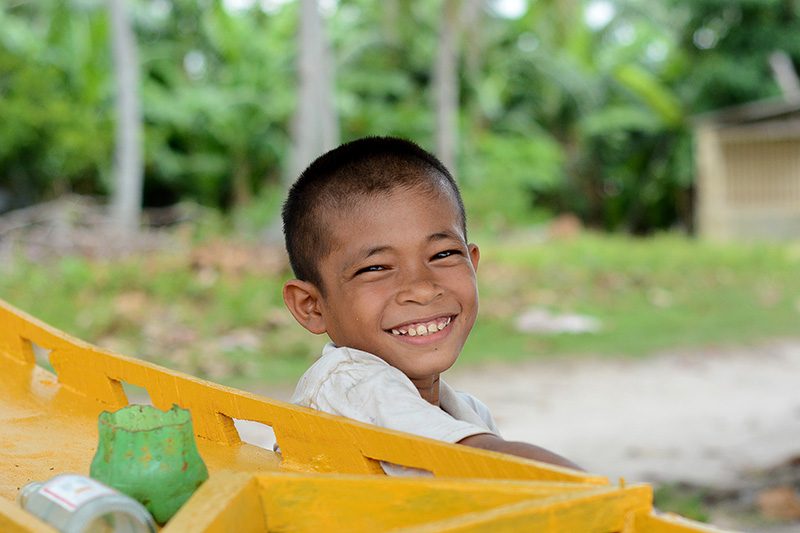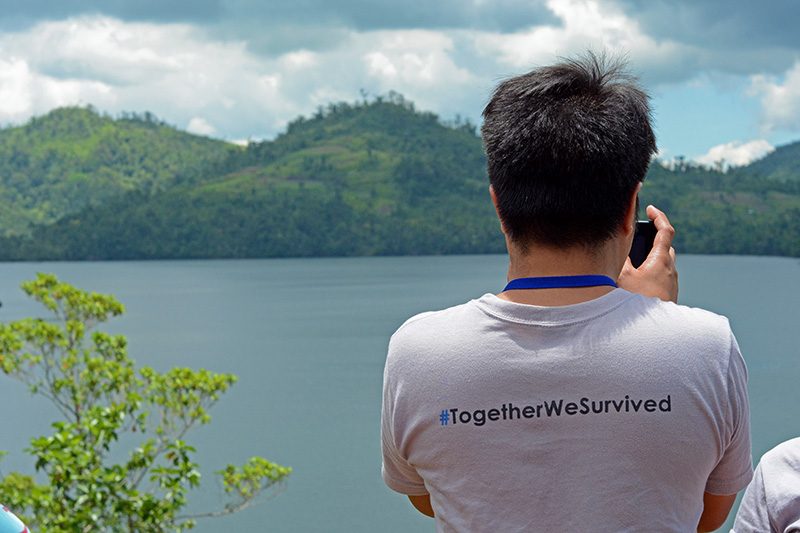Filipino culture is unique, both in the Philippines and around the world. Famous for their incredible hospitality and polite manners, Filipino’s also have some pretty interesting and uncommon things that they say!
Being a foreigner in the Philippines doesn’t have to be hard, as long as you learn these unique Filipino sayings before you go!
After spending more than seven months in the Philippines, including six months volunteering with Yolanda disaster relief in Tacloban, we got a pretty good understanding of the local culture. Here are of favorite things that Filipinos say to foreigners!
Nosebleed in Tagalog / Nose Bleed
The expression ‘nose bleed’ would have to be one of the most interesting, and unique, things that Filipino’s say. The term refers to the idea that if you think too hard, your nose will start to bleed. Filipino’s usually say this in English, nose bleed in Tagalog translates to balinguyngoy. The saying is generally used in reference to Filipino’s trying to speak English.
When a Filipino tries to communicate in English, but gets stuck on a word and freezes, people around them will say ‘nosebleed’ and all start to laugh. It’s a lighthearted saying that isn’t used to be mean, but often leaves the person feeling a little embarrassed.

The best way to explain this is through the following anecdote. One time we were at a bus station and a group of curious, young Filipinos slowly started to crowd around us. One confident teen approached us with a few English phrases and started a conversation. When we continued the conversation and asked him a question he suddenly froze, looked at his mates and then ran away as all the others laughed at him and shouted ‘nose bleed, nose bleed’.
Hey My Friend!
In the Philippines, everyone is your friend, so you better get used to hearing this. Filipinos say this all the time, regardless of whether they know you or not. In simple terms, when a Filipino says ‘hey my friend, it is a friendly way of greeting a foreigner and saying hello.
If you get the chance, while they’re zooming past you in a tricycle or shouting at you from afar, yell back the same thing and watch their smile stretch from ear to ear. Filipino’s love to hear foreigners use the same expression as them, so start to greet people you meet with a simple ‘hey my friend’ and watch their response.

Filipino Hospitality – Sir / Ma’am
Before traveling to the Philippines we’d heard Filipinos were famous for their politeness and hospitality, but we could never have imagined just how nice everyone was, all the time! Any time you meet or greet someone you can expect a sir or ma’am added onto the end, without fail.
This level of politeness is nation wide, no matter who you’re speaking with or who they’re speaking to. Whether you’re speaking to the municipal government about getting your visa renewed, having your gas pumped at a station or down the local fish market, everyone will greet you with that formality.
After seven months around the Philippines I think we’re now officially the politest backpackers going round Southeast Asia!

Hey Joe!
If you’re a white male, get prepared to hear this a lot. Taken from the old World War II nickname for US soldiers (G.I Joe), this now accounts to pretty much any male who looks white and foreign.
It’s not offensive, so don’t be shocked when strangers on the street pass you by and say ‘hey Joe! That being said, it is a little annoying hearing it all the time, especially when you’re living in a town for six months and the locals see you everyday. It’s not like they’re trying to be rude, but when they say ‘hey Joe’, they’re basically calling you out as a white, male from the United States.
It’s a generalization that starts to wear you down eventually! Sometimes to confuse them I just yell back… hey Pinoy! Pinoy is a generalized term for anyone from the Philippines. It holds no negative connotation, but I liked to use it just to mess with the locals.
Come and follow us on Instagram!
What do Foreigners Think of the Philippines?
Filipinos are super proud people and always love to hear what foreigners think of the Philippines. They’re also fairly receptive to constructive feedback, as long as it’s not too mean. They know their traffic in Manila is terrible and they know vegetarian options are slim, but they also want to know how amazing their island are and how they’re literally the most friendly culture ever!
During all of our Philippines travels, as well as while to Filipinos around the world, locals are always curious to know what foreigners think of the Philippines. While we can’t speak on behalf of everyone, we can say that the majority of travelers we meet absolutely love the Philippines! Along with the gorgeous beaches (try Kalanggaman Island or Sambawam Island) and lovely people, the Philippines offers a rugged and less traveled countryside to explore.
Foreigners love exploring the Philippines, not only for the landscapes, but also to connect with the amazing people. Everywhere you go in the Philippines you’ll meet people welcoming you into their homes and their lives, curious to know more about you and to share a piece of their beautiful country with you.
What is Yours?
The first few times we heard this we were super confused. The term ‘what is yours’ literally means, what would you like? It doesn’t really have a translation or meaning, it’s just the way Filipinos ask you what you want. Expect to hear this phrase when you visit a small street store (called a sari-sari store), market stall or sometimes other places where you need to order.
It doesn’t happen all the time, but the first time it did I had no idea what to reply. I just repeated it back to the lady and received some very confused looks as she ushered for her younger English speaking daughter in the back room to come and deal with me.
What is Your Name? Where Are You From?
Most Filipinos speak amazing English, but even if they don’t have the confidence or ability to muster up a conversation, you can be sure they’ll find enough courage to ask you these two questions.
Whether we were traveling through a busy city, or a quiet rural town, many locals were excited to start a conversation with us based off these two questions. They often restricted to these two questions, and got a ‘nose bleed’ when asked return question, but it’s a great way to engage the locals and start up a conversation.

Out of Stock
Either Filipinos aren’t restocking their stores very well, or they’re being polite because they don’t understand me, but if you go into any sari-sari, restaurant, grocery, etc. chances are 1 in 5 items will be… out of stock sir.
They’ll always maintain a very polite manner while informing you, but it can be pretty frustrating, especially if you can see the item you’re looking for.
What Else?
This is a funny one! ‘What else’ is kind of like that scene from Dude Where’s My Car with the Chinese take-out store: and then? And theeeeeeeen? Once you’ve finished ordering something Filipinos like to ask you if you want anything else, multiple times.
‘What else’ pops up more frequently in markets and smaller stores when ordering. Sometimes I end up ordering way too much because I like to see how far they’ll go… they always win!

Welcome to My Country
Whether you’ve been in the Philippines for a week, or a year, Filipinos love to greet you and welcome you to their country. Anytime you’re talking to a Filipino they could surprise you by throwing in a ‘welcome to my country’. It’s extremely welcoming and just another example of their hospitality.
You’d be surprised how many times a stranger stopped us in the street or chatted with us in a Jeepney just to welcome us to the Philippines!
Thank You
When Christine and I came to the Philippines to help with the Yolanda recovery in Tacloban we definitely didn’t come for the praise or the thanks. However, the amount of people who have thanked us for helping their country has truly humbled us. This doesn’t just happen inside the Philippines, this has also happened multiple times when we’ve met Filipinos outside of the Philippines.
Everybody is always curious to know why we spent six months in the Philippines, and when we tell them our story they almost always say a massive heart felt ‘thank you’ for our help.
It’s a great moment that we can share with Filipinos around the world, but now we want to use this opportunity to thank everyone in the Philippines who has made this such an incredible journey and a life changing experience. From the bottom of our heart salamat po!










Hi there guys, salamat po for sharing Philippines to the world. We are glad that you both enjoyed your stay here. God bless the both of you on your future journeys! Mahal namin kayo! ???
Thanks so much Pauie! We had such an amazing time! Thanks for being so friendly and hospitable! xx
A ‘Salamat’ too to you two for being cool friends. Gutted I didn’t get to see you off. But come back maybe? Or meet you halfway — if I don’t forget to move.
I would add:
“Let’s eat”, which they say when you catch them having a meal, even when they don’t really mean it.
“You’re so white/fat/old/any other adjective”, because in areas where Filipinos aren’t being indirect, they’re too f-ing honest.
Much love to the both of you.
Jacques
Cheers brother! Thanks for all the amazing work you’re doing around Tacloban. Sad to miss you before we left, but I know our lives will cross again in the future mate. Let’s eat is a great one, or as Fred would say…. you eat now! Haha. And yes, Filipinos do have a knack for being brutally honest haha.
Keep rocking out champ. Lots of love!
Awesome post Jules. It makes me wish we had come to visit while you were there!
We wish you had of as well! Always next time 🙂
hey there guys, thanks for helping philippines & thanks for sharing your great adventure in the philippines to world…keep going guys. I wish u all the best on your next adventure, wherever it is..god bless!
Thanks you Haydi, and thanks all Filipinos who made us soooo welcome 🙂
Ack so fun! We missed Philippines on our last adventure in SE Asia, and can’t wait to be back and spend a good long time in the country, I fully expect to swap the “what else?” for “where else?” while we are there 🙂
It really is a special place. Hope you get back there soon and enjoy it to the MAX!
You don’t ask for the directions to the nearest toilet/loo/WC you ask for where the CR is or the comfort room. Haha
Haha yeah we learned that one quick!
Yall funny how say THE TOLIET BATHROOM IS CALLED:
Comfort ROOM
What a great read! I enjoyed every word you wrote. That “nose bleed” part got me big time. More articles from you, sir.
Thanks Alfred! We always had a good laugh at the nosebleed comments. Glad you enjoyed!
Hi Julian
Wonderful post. I had to laugh a few times and I hope to remember these phrases and their meaning in a few weeks when we visit the Philippines.
Totally looking forward to visit this amazing country ☺
Thanks for sharing your experiences.
Cheers,
Reni
Thanks Reni! You’re going to have an amazing time. Enjoy a few San Miguels for us 😉
Great observations Jules and Christine… You missed “ingat lagi” or take care always…
Cheers Butz! Glad you enjoyed it 🙂
One thing I’m guilty of is using ‘For a while.’ because it could mean a looonggg while. I always get a blank stare or a surprised look after. 🙂
Haha that’s another great one. I seriously think I might do a part 2 with all the contributions 🙂
Hi. I enjoyed reading your article 🙂 and it was always fun to see the reactions of foreign tourist when they blog about their experiences with their stay. By the way, I read the article becaused I recognized the pic of the guy at the start of the article, he is my brother’s friend lol.
I just wanted to add something about the Nose bleed part, I met a foreign tourist when I was visiting Sagada and he had the confused face when we were engaging on a conversation and one of my friends shouted “wooh nose bleed”.
It actually started as a joke from a movie (if I remember it right), when the lead started talking to a foreign tourist and when she had no more generic responses to offer like yeah, yes, sure, no thank you, her nose started bleeding as a sign that she can no longer speak english as a response. It seem really weird but it’s always been used as a term so it kinda stick and yeah, it’s funny. ? Although, in my opinion it’s also a way of letting us know that most of us are not very fluent with the english language, and as a Filipino, I don’t find it insulting but a room for learning. Cheers! 😀
Haha small world! That’s funny that you know him. He was a great guide and we really enjoyed our time in El Nido on the tours. Tell him we said hello and have been recommending the tours to everyone we met 🙂
Nose bleed really is a funny term, it’s interesting to hear the origins of it haha. You might not be fluent, but your English is amazing! We were so impressed my all the Filipinos we met how spoke such great English. Certainly a lot better than my Tagalog or Waray-Waray haha. Thanks for stopping and commenting, it was great to hear from you!
Will do! Thanks for helping us promote El Nido! And the amazing english was through loads of practice! Haha cheers! ??
No worries Sheila! Keep El Nido beautiful for us until we return 🙂
I head to the Phillipines next week – so excited for some politeness after spending a year in China!
Oh get ready for it! They are amazing!
I so know what you mean. I lived in Guangzhou, China for 7 years. Such rudeness without any sort of manners. I now live here in Pampanga, Philippines.
Ahhh the never ending Ma’am Sir!
Yeah they certainly are polite 🙂
As a Filipina, I dislike hearing “Ma’am” or “Sir” – it reflects our colonial mentality and evokes subjugation. We were, excuse my language, f_kked up by foreigners for so long and I am (to be honest) a bit confused about what a “Filipino” should be. I have explained to foreigners that we are very Latin in our hearts and sensibilities yet on the outside and in our brains we are wannabe Americans. That’s how I feel.
I also dislike hearing the combination of “Maamser”. An American acquaintance was amused upon hearing it and said to me “Now that is confusing.” (she’s a lady). An Australian colleague once said to my former boss (as a joke) “Are you knighted now?” when someone addressed my boss as “Sir”. That was funny.
Had a good laugh. Thanks for sharing your awesome experience! Did you also notice how we give directions or when you ask where or when you are looking for something or some place? It is by pointing the mouth to the direction you are suppose to go or where you can find the place… These are some funny things we Filipinos do. It is also cute in some ways. We hope you will come back and enjoy our beautiful beaches and people.
Haha yes we did notice that for sure. So funny! We hope to be back soon enough as well 🙂
Hi Jules and Christine… Everything you wrote on your post was so true…You really have immersed yourself to the Filipino culture… Thanks for the sweetest article… We’re glad you two enjoyed your stay in our beloved country… Please do come again…
Growing up in the Philippines I remember saying “hey Joe” to all male foreigners even if they were not Americans. And we were taught to always offer food to visitors even if we don’t have enough for ourselves because God will provide us with more Grace in return! Ok Let’s eat! We really mean it
Thanks for stopping by Delia! Filipinos sure are generous and hospitable! It’s one of the things we loved most about your amazing country! Salamat po!
chanced upon your website – it’s great! I was just looking for info about Apo island bec. my friend told me about it. Well, I got much more than what I was looking for. I particularly want to thank you for teaching us how to travel with responsibility and respect for the environment – mainly with your good example and experience.
Thank you Elaine! We appreciate that you’re putting in the effort to travel sustainably! You rock!
Thank you for visiting our country and thank you for helping our fellowmen. It reminds me when we were still young. One of our neighbors saw a foreigner and said, “Hey Joe!”. The foreigner was obviously upset and replied, “I’m not a Joe”. But you’re right. This is not offensive to us. Some people just don’t know that not all whites are Joes. Also sometimes, we love to greet people by saying let’s eat. If you visit someone’s place or house, one way of welcoming people is by offering them food maybe softdrinks because for us, cola is trying best drink to offer not just water. We never offer a guest with water or tea. If you’ve been offered then it’s one in a million. Also, we use the word ” as in? ” which means really or seriously? Also salvage has a different meaning in my country. Salvaging area means an area where many people who were killed were thrown there. So if someone was salvaged, it means someone was killed and left somewhere. Also, don’t be surprised if you’re invited to a party or a feast and most of the food are meat. Definitely meat. You’d hardly expect Filipinos to cook some vegetables and prepare salad. Maybe because we eat vegetables everyday that we don’t eat it on special occasions. I once prepared salad on a special occasion and I ended up eating all the salad.
It’s the only blog I read and honestly I can’t stop laughing about that facts. Expecting more from you <3
Thanks so much Val! We’re so glad you enjoyed the article! Please come connect with us on Facebook or Instagram so we can say hello 😀
I am an American married to a beautiful Filipina from Tacloban. Our family was greatly effected by Yolanda. My family is PNP, DSWD, and Army, and worked closely with relief workers. They are so grateful for the assistance. I wish to thank you for sacrificing your energy, time and treasure to help my family and their neighbors recover. We come home each year, and I am amazed how Tacloban has rebounded from such destruction. It is a testament to the resilience and toughness of Filipinos.
One thing you did not mention; although it is not exactly a saying, is how they point to something. By pursing their lips in the direction of what they are pointing at. I LOVE this and have taken it as a habit as well.
Hey Fred thank you for your kind words. Tacloban will always be a special place for us and we hope to get back there someday soon. And YES, we definitely missed the ‘pointing with your lips’ hahaha. That is so true!
I spent almost 2 weeks in the Philippines in May 2019, when my son married his Filipina bride on what would have been my dad’s 100th birthday. The date was meaningful because my dad spent almost 6 years in the Philippines in WWII fighting the Japanese who had invaded that country. I want to go back next year (2021), and explore some of the beautiful beaches and caves and other island attractions where perhaps my dad had been while he was there.
Hello, when one is giving people the silent treatment because they are mad at them, there is a Filipino word for it, but I forgot it.
Very interesting article on the Philippines and the comments. I was searching the net to understand why some Filipino women in the United States call white women “mum”. It has been annoying to me because I feel that it insinuates that the Filipino woman is in a lesser position so I was pleased to see AV’s comments & history on the subject.
Wishing you good travels and hope you write more.
Some of this is accurate across the country, but some you mention is just in a particular area or person.